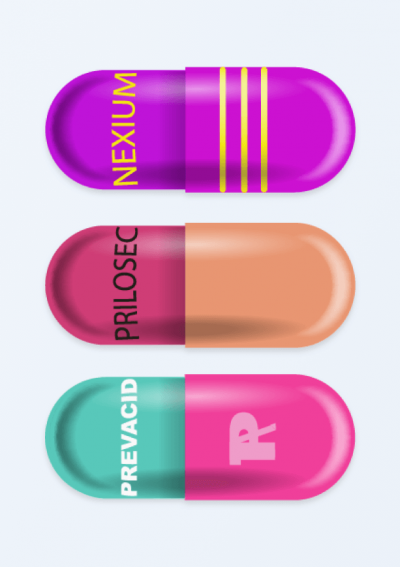Proton Pump Inhibitor Lawsuits
Proton pump inhibitor lawsuits claim that these drugs commonly used to treat acid reflux, caused serious side effects such as kidney damage and failure. Patients have filed lawsuits against PPI manufacturers, alleging that they failed to adequately warn of these risks.

Latest Proton Pump Inhibitor Lawsuit Updates
Millions of Americans rely on prescription proton pump inhibitors to prevent and treat heartburn and other acid-related stomach disorders. PPIs work best when taken over a long period of time, but research connects long-term use to serious kidney concerns.
Studies link the widely prescribed medications to kidney damage and kidney failure, as well as some cancers. As of July 2024, 18,668 people in the U.S. have filed lawsuits against PPI manufacturers after developing renal problems. Of these cases, 12,769 are still active as the settlement process is underway.
In October 2023, AstraZeneca announced a $425 million settlement for claims against Nexium and Prilosec, which should resolve most cases in the NJ MDL. The settlement agreement was announced just days before the first bellwether trial scheduled on October 10, 2023.
According to AstraZeneca, a single case remains pending in the US District Court for the Middle District of Louisiana. The trial is scheduled in that case for April 15, 2024.
- October 2023: AstraZeneca announced a $425 million settlement for claims against Nexium & Prilosec.
- June 2023: The first bellwether trial was scheduled to begin June 5, 2023, but was later postponed. Plaintiff James Rieder alleged taking Nexium led to his diagnosis of chronic kidney disease.
- June 2022: Defendants requested to bar plaintiff James Rieder from filing a lawsuit against them based on the Ohio statute of limitations for product liability. Special Master Ellen Reisman denied the request and determined the trial could proceed as a bellwether case.
- May 2023: Judge Cecchi, presiding over the PPI multidistrict legislation, held a status conference but did not make the updates public.
- April 2023: Judge Cecchi set a deadline for a Joint Pretrial Order to the Court of June 1, 2023.
- March 2022: More than 13,000 cases were pending in the proton pump inhibitor MDL.
- August 2017: The U.S. Judicial Panel on MDL combined lawsuits against PPI manufacturers into one New Jersey MDL.
Unlike a class action, each lawsuit in an MDL remains its own separate case. The combined proceedings help the courts efficiently manage several similar complaints and prevent court backlogs.
Plaintiffs name different manufacturers of PPI products in the MDL, including drug-making giants AstraZeneca and Merck. The products of concern include Nexium, Prilosec, Prevacid, Protonix and Dexilant, both over-the-counter and prescription.
Why Are People Filing Proton Pump Inhibitor Lawsuits?
Plaintiffs are seeking compensation for injury and disease they developed because of the use of PPIs. Since 2017, the FDA has issued several safety warnings about the long-term use of PPIs, and plaintiffs claim that PPI manufacturers knew the risks to the products but failed to warn consumers.
Proton pump inhibitor lawsuits in the MDL outline a number of damages from using these medications. These include life-threatening conditions.
- Acute Interstitial Nephritis
- Acute Kidney Injury
- Chronic Kidney Disease
- End-stage renal failure
A 2022 meta-analysis from the American Journal of Clinical Oncology determined that PPI use increases the risk of cancer. The researchers analyzed data from more than 6 million participants covering multiple different forms of cancer. The data from this analysis shows that PPI use increases the risk of gastric, pancreatic and colorectal cancers.
PPI Use Is Linked to Kidney Damage
Research has shown a link between using proton pump inhibitors and kidney damage, including acute kidney injury. As far back as 1997, a study from an Australian hospital noted a link between omeprazole — the active ingredient in Prilosec, Zegerid and other PPIs — and kidney injuries. Since then, research has linked PPIs to cases of acute interstitial nephritis, a serious inflammatory kidney condition.
A meta-analysis based on 12 observational studies showed a significant association between PPI use and the risk of AKI. Additionally, a report in the Hospital Physician Journal declared PPIs to be the “most common cause” of acute interstitial nephritis based on multiple large hospital studies.
In this meta-analysis, we found that PPI use was associated with an increased risk of AKI. Given the high prevalence of PPI use among patients with gastric disorders, safe prescription practices are necessary to ensure patients are not put at undue risk.
Studies also show that PPI users are at a 20-50% increased risk for chronic kidney disease. The average time patients used PPIs before developing CKD was approximately five months. Patients who used PPIs twice daily had an increased risk.
Bone Injury and Other Complications
In addition to kidney damage, PPIs are associated with bone and nerve injury. Studies indicate menopausal women have an increased risk of fractures and PPI use further increases this risk.
Additionally, a 2022 study in the International Journal of Surgical Reconstruction indicates that long-term, high-dose daily use of PPIs increases the risk of nerve damage. Patients using the medication also take longer to heal broken bones after surgery.
Physicians should be aware that long-term PPI use is associated with a modest but rather consistent increase in the risk of fragility fracture. Consequently, long-term PPI use should be prescribed only in cases of strong validated and recognized indications.
Multiple lawsuits followed a 2010 FDA warning that prescription and OTC PPIs could increase the risk of spine, hip and wrist fractures. The FDA withdrew the warning in 2011. The agency explained that OTC heartburn medications are intended only for short-term use and therefore didn’t carry the same risks as prescription PPIs, which patients take at higher dosages and for longer periods of time.
As hundreds of bone fracture cases mounted against AstraZeneca in 2012, the U.S. Judicial Panel on Multidistrict Litigation created an MDL in the Central District of California. Some manufacturers offered PPI lawsuit settlements. While the FDA said in 2023 that for the majority of users, PPI use isn’t likely to increase bone fractures or lower bone density and didn’t recommend product warning labels at this time, plaintiffs continue to pursue manufacturer accountability for their PPI-related bone injuries.
Who Is Eligible to File a Proton Pump Inhibitor Lawsuit Settlement Claim?
You may be eligible to file a PPI lawsuit if you developed acute kidney issues or chronic kidney disease after using a PPI. Additionally, if you were prescribed a PPI during recovery from bone surgery and your fracture did not heal as expected, or if you were prescribed a PPI during menopause and developed a bone fracture, you may have a case. Research has also linked PPI use to some forms of cancer.
To determine whether you’re eligible to file a PPI lawsuit or join PPI MDL, speak to an attorney with experience in product liability lawsuits. They can advise you on how best to proceed.
Steps for Filing a PPI Lawsuit
There is a lot of information to consider before filing a PPI lawsuit. Discuss your potential claim with an experienced lawyer who will advise you on what to expect, including what documents you may need and what damages you can claim.
- Contact a PPI Injury Law Firm: Reach out to a PPI law firm to discuss your specific situation.
- Hire a Personal Injury Lawyer: Work with a lawyer specializing in PPI cases who you feel comfortable working with throughout the legal process.
- Understand the Civil Lawsuit Process: Ask your lawyer questions to help you feel comfortable with the civil lawsuit process and know what to expect.
- Gather Evidence: Work closely with your PPI lawyer to gather all relevant information to strengthen your PPI lawsuit.
- Calculate Damages: Your PPI lawyer will review costs incurred as a result of your PPI-related injuries. They may advise seeking both punitive and compensatory damages.
- Determine Liability: Liability typically falls on the manufacturer of the prescribed PPI.
- Demand Compensation: Your PPI lawyer will help you make a formal demand for compensation to cover your damages. This may lead to a settlement agreement or a verdict.
If you used prescription or OTC PPIs and later developed a kidney injury, you may be eligible to file a PPI lawsuit. Timing can be an essential factor when filing legal claims, so talk to a PPI lawyer as soon as possible if you think you may have a claim.
16 Cited Research Articles
Consumernotice.org adheres to the highest ethical standards for content production and references only credible sources of information, including government reports, interviews with experts, highly regarded nonprofit organizations, peer-reviewed journals, court records and academic organizations. You can learn more about our dedication to relevance, accuracy and transparency by reading our editorial policy.
- U.S. Judicial Panel on Multidistrict Litigation. (2024, July 1). MDL Statistics Report - Distribution of Pending MDL Dockets by District. Retrieved from https://www.jpml.uscourts.gov/sites/jpml/files/Pending_MDL_Dockets_By_Actions_Pending-July-1-2024.pdf
- AstraZenica.(2023, October 3). AstraZeneca settles Nexium and Prilosec product liability litigations. Retrieved from https://www.astrazeneca.com/media-centre/press-releases/2023/astrazeneca-settles-nexium-and-prilosec-product-liability-litigations.html
- Pfanner, E. (2023, October 3). AstraZeneca Pays $425 Million in Nexium, Prilosec Settlement. Retrieved from https://www.bloomberg.com/news/articles/2023-10-03/astrazeneca-pays-425-million-to-settle-nexium-prilosec-cases
- Han, C. T. et al. (2023, March 24). A Meta Analysis of Proton Pump Inhibitor Use and the Risk of Acute Kidney Injury: Geographical Differences and Associated Factors. Retrieved from https://www.mdpi.com/2077-0383/12/7/2467
- Zhang, M. et al. (2022, November). Proton Pump Inhibitors and Cancer Risk. Retrieved from https://journals.lww.com/amjclinicaloncology/Abstract/2022/11000/Proton_Pump_Inhibitors_and_Cancer_Risk__An.5.aspx
- Steinberg, Julie. (2022, July 20). AstraZeneca, Merck Nexium Claims Should Advance, Judge Says. Retrieved from https://news.bloomberglaw.com/litigation/astrazeneca-merck-nexium-claims-should-advance-judge-says
- Wu, B. et al. (2021, February 11). Proton pump inhibitors associated with acute kidney injury and chronic kidney disease: data mining of US FDA adverse event reporting system. Retrieved from https://www.nature.com/articles/s41598-021-83099-y
- Bloomberg Law. (2017, August 4). Nexium, Other Heartburn Drug Suits Sent to New Jersey. Retrieved from https://news.bloomberglaw.com/pharma-and-life-sciences/nexium-other-heartburn-drug-suits-sent-to-new-jersey
- Lazarus, B. et al. (2016, February 1). Proton Pump Inhibitor Use and Risk of Chronic Kidney Disease. Retrieved from https://www.ncbi.nlm.nih.gov/pmc/articles/PMC4772730/
- Antoniou, T. et al. (2015, April 16). Proton pump inhibitors and the risk of acute kidney injury in older patients: a population-based cohort study. Retrieved from https://www.cmajopen.ca/content/3/2/E166.short
- Harvard Health Publishing. (2012, February 1). What you should know about: PPIs. Retrieved from https://www.health.harvard.edu/diseases-and-conditions/what-you-should-know-about-ppis
- Anderson, M. et al. (2011, May 10-13). Proton Pump Inhibitor Use in Hospitalized Medical Patients. Retrieved from https://shmabstracts.org/abstract/proton-pump-inhibitor-use-in-hospitalized-medical-patients/9
- FDA. (2011, March 3). FDA Drug Safety Communication: Possible increased risk of fractures of the hip, wrist, and spine with the use of proton pump inhibitors. Retrieved from https://www.fda.gov/drugs/postmarket-drug-safety-information-patients-and-providers/fda-drug-safety-communication-possible-increased-risk-fractures-hip-wrist-and-spine-use-proton-pump
- Chan, M.R. et al. (2009, February). A 78-Year-Old Woman with Proton Pump Inhibitor-Induced Acute Interstitial Nephritis. Retrieved from https://citeseerx.ist.psu.edu/viewdoc/download?doi=10.1.1.550.5003&rep=rep1&type=pdf
- Badov, D. (1997). Case report: Acute interstitial nephritis secondary to omeprazole. Retrieved from http://citeseerx.ist.psu.edu/viewdoc/download?doi=10.1.1.913.4613&rep=rep1&type=pdf
- United States District Court District of New Jersey. (n.d.). In: Re: Proton-pump Inhibitor Products Liability Litigation. Retrieved from https://citeseerx.ist.psu.edu/viewdoc/download?doi=10.1.1.913.4613&rep=rep1&type=pdf
Calling this number connects you with a Consumer Notice, LLC representative. We will direct you to one of our trusted legal partners for a free case review.
Consumer Notice, LLC's trusted legal partners support the organization's mission to keep people safe from dangerous drugs and medical devices. For more information, visit our partners page.
844-420-1914
